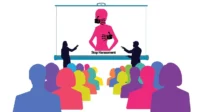Mental illness is a serious problem in many countries around the world (Sari & Yuliastuti, 2018). Recovery from illness is difficult for those with mental disorders. However, society stigmatizes them. Stigma is the negative categorization of a specific group of people, and it can be harmful to those who suffer from mental illnesses.
First, stigma creates a negative perception of mental illnesses. Second, it keeps those who are suffering from mental illness from getting the professional treatment. This causes them to lose their sense of self-worth and self-efficacy. Additionally, stigma can result in discrimination against individuals with mental illnesses (Hartini et al., 2018).
Hartini et al. (2018) stated discrimination will prevent them from making use of two crucial opportunities for achieving their life’s ambitions: the chance to work and the chance to live a safe and independent existence. Unfortunately, stigma against people with mental illness is not only limited to the general public.
This stigma also occurs among medical professionals such as psychiatrists, psychologists, and nurses who work with people with mental illness (Hartini et al., 2018). People with mental disorders are often marginalised and discriminated, which is contrary to their healthy rights (Tristiana et al, 2018).
At this point, public awareness of mental health issues in Indonesia needs to be raised and addressed. The stigma related to mental health issues often gets worse by this information. Patients with mental health issues may experience a negative impact if stigma exists in society at large. The stigma keeps the patient away from the best handler that can be obtained (Hidayati, 2022).
In particular, nursing students’ attitudes toward people with mental illness will influence the quality of care these patients receive (Sari & Yuliastuti, 2018). If nursing students’ also stigmatize people with mental illness, it will make them feel uncomfortable and unable to get good mental health services. Mental health services are very difficult to obtain due to prolonged social stigma (Coombs et al., 2021).
Other people’s judgments almost always stem from a lack of understanding about mental health, so the information is not fact-based (Mayo Clinic, 2017). At the moment, several kinds of judgments surrounding mental illness have become a stigma. People with mental illness are weak, lack religion, risk of violence, need to take medication for the rest of their lives, or they are just pretending (Ard, 2022).
Stigmatization of people with mental illness is a reality, something that is real and encountered every day in society. It appears in all walks of life, not just the general public, and even within the medical profession, it is still a stigma. There are many types of reasons why mental illness is stigmatized, including the belief that mental illness is a disgrace, misconceptions about mental illness, a lack of family support, and feelings of shame.
The impacts are also very serious, such as reduce self-esteem and self-confidence, social isolation that makes it difficult to get accurate information, being judged unworthy of education and work, and social isolation that increases the stress of feelings and thoughts.
This stigma can be reduced by educating the public about mental illness, educating families about how to live with people with mental illness, strengthening consumer and family organizations, conducting public campaigns on mental health, and improving mental health care.
Penulis: Raudhoh Zahirah
Mahasiswa Psikologi Universitas Pendidikan Indonesia
Editor: Ika Ayuni Lestari
Bahasa: Rahmat Al Kafi
Ikuti berita terbaru di Google News
Reference
Ard. (2022). Stigma Gangguan Jiwa dan Dinamika Kesehatan Jiwa di Masyarakat. news.uad.ac.id. Accessed from https://news.uad.ac.id/stigma-gangguan-jiwa-dan-dinamika-kesehatan-jiwa-di-masyarakat/
Coombs, N. C., Meriwether, W. E., Caringi, J., & Newcomer, S. R. (2021). Barriers to healthcare access among U.S. adults with mental health challenges: A population-based study. SSM – Population Health, 15, 100847.
Hartini, N., Fardana, N. A., Ariana, A. D., & Wardana, N. D. (2018). Stigma toward people with mental health problems in Indonesia. Psychology Research and Behavior Management, 11, 535-541.
Hidayati, N. K. [CPMH Psi UGM]. (2022). Kuliah Online: Stigma dan Masalah Kesehatan Mental [Video]. Youtube. https://www.youtube.com/live/bpmcvVt4_IY?si=fkw92RxP–M4jFzV
Mayo Clinic. (2017). Mental health: Overcoming the stigma of mental illness. Mayoclinic.org. Accessed from https://www.mayoclinic.org/diseases-conditions/mental-illness/in-depth/mental-health/art-20046477
Sari, S. P. & Yuliastuti, E. (2018). Investigation of attitudes toward mental illness among nursing students in Indonesia. International Journal of Nursing Sciences, 5(4), 414-418.
Tristiana, R. D., Yusuf, A., Fitryasari. R, Wahyuni, S. D. & Nihayati, H. E. (2018). Perceived barriers on mental health services by the family of patients with mental illness. International Journal of Nursing Sciences, 5(1), 63-67.















